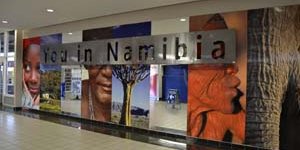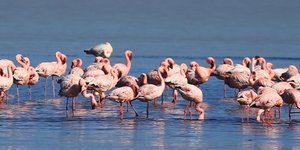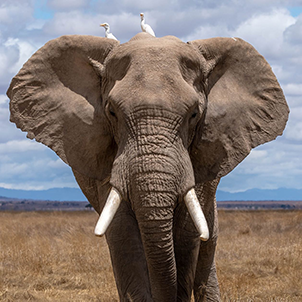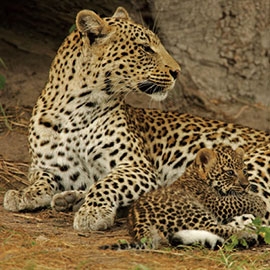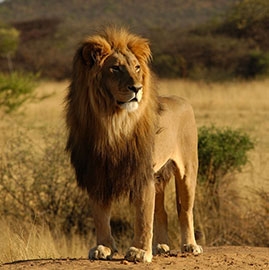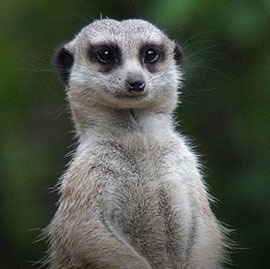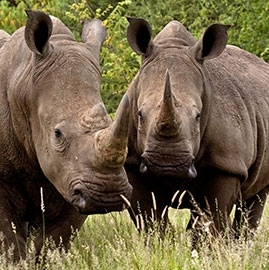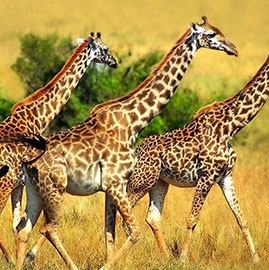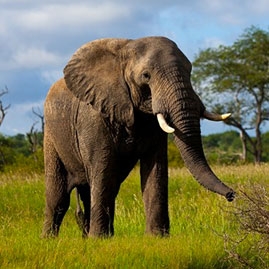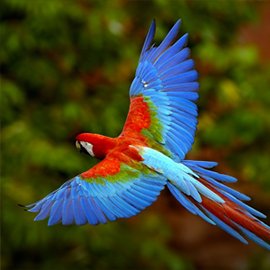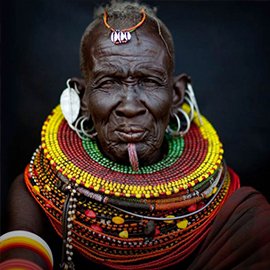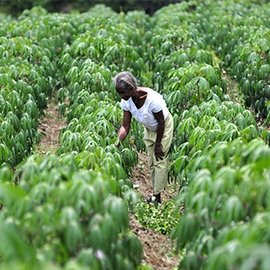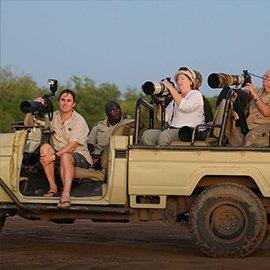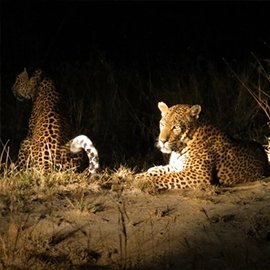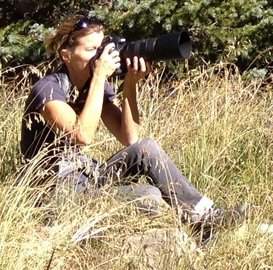Etosha National Park
Safari suitability: 9/10
Find your tourOf the big five, only the buffalo don't roam here. This park has a great tourist infrastructure.
What YAS members think
Highlights
- Best time to visit is between May and September
- Self-drive safaris are permitted
- Arid, pleasant climate makes for a comfortable safari
About Etosha National Park
Established in 1907, Etosha National Park is located in the northwest corner of Namibia. Etosha is 22,270 km² (8600 mi²), making it the sixth largest national park in Africa. The name ‘Etosha’ means ‘place of dry water’ or ‘huge white area’ which can be attributed to the fact that roughly 20 – 25% of the park is covered by a great salt pan. Etosha is an excellent destination for game viewing and four of the big five can be spotted here – elephant, leopard, lion and rhino (both black and white). Only the buffalo is absent.
While Etosha may be one of more established national parks in Africa, it offers a limited number of lodging options inside the park boundaries. Only a handful of camps exist, most of which are situated around a permanent waterhole for game viewing opportunities. Many guests choose to stay outside the park boundaries, where there is a wider range of accommodation. However, because the park’s entrances are closed from dusk until dawn, those staying outside the park will not be able to partake in any night drive safaris and may wish to consider this when booking their accommodation.
Etosha is a well-established national park that offers excellent game viewing opportunities all year round. Although it does not have an extensive range of lodging options inside the park, the camps that are inside the park are of good standards and are ideally situated for wildlife encounters. Etosha is recommended for all levels of travelers.
When is the best time of year to visit Etosha National Park?
The game viewing in Etosha National Park is excellent year-round, with the best times to visit coinciding with the dry, cooler season. From May to September the extremely low levels of precipitation force wildlife around the few remaining water sources, making game viewing in Etosha spectacular. The daytime temperatures are also more tolerable during this time of year although, with the low levels of humidity, Etosha’s climate is very agreeable at any time of the year. The arid conditions mean the flora of Etosha is mainly grass, savannah and smaller trees. Two of the more prevalent species of trees in Etosha are Mopane and Moringa. The Mopane thrives in a high alkaline environment and the Moringa, a hardy tree with nutritious leaves, is drought-resistant and grows in dry, sandy soils.
Im often asked why Etosha holds such a special place in my heart? I could say that it is the chance to view vast numbers of wildlife species drinking together, the stark arid landscape or the camps floodlit waterholes that put on nightly spectacles, but really I think it is the countless photo opportunities. There is nowhere quite like Etosha for imagery. Im not sure whether its the light or the dust or a combination of both, but the park gives endless opportunities to capture that perfect wildlife image. It doesnt seem to matter what season you visit, the results are the same unique photographs taken in perfect light in pristine landscapes. Ive been photographing wildlife now for nearly 20 years in Etosha. Just when I think Ive taken the ultimate shot an even better one is waiting for me next time.
Sort by:

This massive park is a must see. Being semi-arid, animals tend to congregate around artificial and natural waterholes making it relatively easier to spot them. Having visited Etosha National Park several times, it does not disappoint, and it is accessible all year round even during Namibia’s rainy season. It is worth exploring all corners of the park, north, south, west and eastern parts. Different vegetation types implies different animals and congregations around the waterholes.
One of Nature Travel Namibias guides who loves exploring the Etosha National Park writes the following review about this spectacular Namibian National Park: "In my opinion, Etosha is one of Africas greatest National Parks. It covers more than 20,000 km2, is one of the world's great wildlife-viewing venues. The Etosha Pan, meaning The Great White Place, is believed to be formed over 100 million years ago and it is 130kms long and up to 50kms wide, which covers a quarter of the whole park. The dramatic open landscapes with the white soil from the Etosha pan set a scene that only a photographer can dream of. The sheer vastness of the Park and its great diversity make for an awesome safari. In all of my visits to the park I have yet to be disappointed. Etosha known as the great white place really has something for everyone. From the majestic big cats like Lion, Leopard and of course Cheetah. By the way probably one of the best places in Southern Africa to see the beautiful Cheetah. Large herds of Zebra, with both Burchells and Hartmanns Zebra occurring-the only place in the world where this is possible. Large herds Elephants roam the massive park and the experience of seeing these large gentle giants coming down to drink is breath-taking. Antelope are abundant with Oryx (Gemsbok), Springbok, Kudu, Impala, Black-faced Impala (endemic to Etosha), Blue Wildebeest, Damara Dik-dik( Endemic), Eland, and Red Haartebeest being some of the species seen over my trips to the Park. Etosha is home to both White and Black Rhino and in my experience from travelling all across the continent its the best place to see the rare and endangered Black Rhino. Other special sightings I have had in the park have been: Caracal, Serval, brown Hyena, Bat eared Fox and Honey Badger. This park is truly amazing and a must for any wild life enthusiast. The park also offers some amazing birding for the twitchers, with just over 380 bird species recorded in the Park, some of the highlight on my trips have been: Blue Crane, Secretarybird, Red-necked Falcon, Kori Bustard, Burchells Sandgrouse, Monteiros Hornbill, Bradfields Hornbill, Crimson-breasted Shrike, Violet Wood Hoopoe, Barred Wren Warbler, Caspian Plover, numerous Larks, Double-banded Courser and Rufous-eared Warbler to name a few. I have had many visits to this amazing national Park and I can assure you, that you wont be disappointed."
I visited Etosha a few years ago and it was totally memorable. The park is very flat and you can see animals for miles, most were around the huge salt pan inside the park which is incredible to see. We stayed in a tented camp just outside the park close to the Anderson Gate. We spent a few days driving around the park and there was never any time that we did not see animals, big or small, especially lots and lots of field game. My favourite animal is the giraffe, and the park did not disappoint for me to see. many Giraffe's. Also not very crowded and you can drive around at ease. Definitely recommend going with a qualified and experienced game ranger in a 4x4 game vehicle who is able to give you lots of insights.
If we had to explain Namibia in a few words, it would be a photographer's dream. On a recent trip to Sossusvlei, Damarland and Etosha National Park we were left dumbfounded once again by this country's amazing natural beauty. Etosha National Park, specifically, has some amazing lodges with spotlit waterholes where you can spend your day, and night, watching animals in their natural environment.
The Etosha National park is one of the biggest wildlife resorts in Namibia and it provides accommodation, camping, sleeping under the stars. The waterholes is something you don't see every day. I will recommend this trip to any tourist who wants to go on a journey of a lifetime.
Etosha National Park offers unequal wildlife sightings and it's a definite 'must-see' for visitors to Namibia! During my journeys through the park I experienced very close, yet undisturbed encounters with animals: a female leopard with two small cubs sunbathing in the middle of the main road in the early morning sun (caution to all who exceed speed limits in the park!), springbok giving birth next to pride of lions, over 60 elephants crossing the road right in front of the car, huge male lion sunbathing on the main road, giraffe (unfortunately) struck by a lightning, leopard with its kill on the tree right next to the road, 3-days mating lions' session at one of the waterholes and 16 lionesses and a male hunting in the plains of the park! Just to name a few! I highly recommend visit to the park, as one of the best wildlife experiences!
This was our first safari and visit to Namibia, we drove throughout the country and had no idea how to visit the game park, we simply rented a saloon car which I will not recommend, of course! We felt very small...the wildlife was amazing and we saw a great variety of game including lions. Safaris in Namibia are unlike other places. Etosha is huge and not crowded, you feel the wildlife environment. I will always remember the stunning landscapes, white dust lands, and quiet sunsets. Lodges we stayed in were quite comfortable and Namibians are such sweet people. I definitely recommend a truly different experience in Namibia.
My camping in Etosha was set up at Halali near waterhole and we spent most of the days traversing through the park from view point to view point, which was great! Although our group was travelling during rainy season I enjoyed viewing abundant wildlife everywhere! I also enjoyed coast and dunes, especially sandboarding in the dunes, even at my age as I'm considered a senior. Food served on tour was excellent, I especially appreciate quick, efficient and personal service, which I met at Wild Wind Safaris. Due to their efforts and their personal love for Africa, I have now Africa forever embedded in my heart and am already planning my next trip!
Namibia is a country full of contrasts and contradictory landscapes. From the million year old sands of Namib-Naukluft National Park to the lushness of the Waterberg Plateau, the diversity is breathtaking. After the desolation of sand dunes, Etosha in October was delightfully teeming with antelope of all varieties. The best part, most herds had healthy contingent of babies in their midst. Most notable was the unusually high concentration of Hartebeast. While I was on Safari in Etosha I was saddened to hear that it's a species in danger, and yet it's one of the most sought after game to hunt. The herds grazed en masse, and for the rest of my time in Africa (two months), no where did I experience such a spectacle. As for Etosha on the whole, the park itself is fairly homogeneous in terms of vegetation, with little variation. And while some may find this fact to be a disenchanting, the arid landscapes, and sun-burnt savannahs make for excellent game viewing opportunities. While I would make this a one-stop-shop for 'Big Five' game viewing, there was so much fauna in the sky and on land to see. An added bonus, the park was relatively empty so snagging that perfect nature photograph was a cinch!
No trip to Namibia is complete without a visit to the Etosha National Park. This huge game reserve in the north of the country is a must for wildlife lovers as it is not only possible to see the Big Five but game is plentiful and visitors are guaranteed good animal sightings. Park facilities are good, roads are maintained and the accommodation is clean and perfectly adequate although not exactly luxurious. Visitors who like rose petals in their bath may want to opt for one of the private lodges just outside Etosha. It is a great park for anyone wanting to see lots of animals, lots of the time. But bear in mind that the park is huge, so there is a quite a bit of driving between camps. Especially at the slow speed required, it can take hours to get to your bed for the night. It is also not exactly the worlds most attractive park think one big salt pan, going on for hours and hours and hours. I prefer the diversity of the Kruger National Park, the lush vegetation of Hluhluwe or the landscape of Pilanesberg. I enjoy looking for the game myself, finding joy in driving through dense vegetation and then suddenly an elephant steps out in front of the car. There is something predictable and slightly uninspiring about Etosha. Dare I say it? Etosha is just the smallest, tiniest, littlest bit of a yawn.
Driving to Etosha from Windhoek
The drive from the international airport in Windhoek to Etosha is around 4 to 4.5 hours, in normal conditions. Many people hire their own cars in Namibia and do a self-drive safari.
Flying to Etosha National Park
Air Namibia offers daily flights from Eros Airport to Ondangwa Airport. Ondangwa is just north of Etosha. The flight is one hour in duration.
The following airlines travel to Etosha National Park

The company is registered as Nomad Aviation (Pty) Ltd trading as Bay Air Aviation, with administrative offices in the coastal town of Walvis Bay and the operational hub at Eros Airport, Windhoek. The company is known to offer charters and scheduled flights, transporting of passengers and freight in Namibia and neighboring states, using light to medium class aircraft. In addition to operating in Namibia the company has completed contract work in Angola, Congo, Niger as well as South Africa using mostly King Air 200s, Beechcraft 1900s and Cessna Grand Caravans. Bay Air has been operating scheduled air services between Walvis Bay and Windhoek Eros as well as Windhoek and Johannesburg for the past 8 years. It is an aircraft charter company specializing in scheduled and non-scheduled air transport. The two directors, its founding members, have been in business since 1989. Visit website
Also flies to:




Majestic Air provides a highly efficient service to travelers who wish to avoid the tedium of travel on South Africa's congested roads and in railways. Majestic Air is owned by David Maree who, as a businessman and commercial pilot, has used aircraft for business travel within South Africa and neighbouring countries. He has personal experience of the practical and cost-effective benefits of the use of aircraft as an alternative to travel by car and train. Majestic Air is operated by Multimedia Entertainment Group Air (PTY) Ltd) trading as MEGA Air as Air Charter & schedule Company in South Africa. The Company was established in the year 2004. Their aircrafts are capable of operating to smaller or rural airports where scheduled services are not able to. Visit website
Also flies to:




Pleasure Flights & Safaris is based in the coastal town of Swakopmund, Namibia's premier holiday destination. Over the past ten years, Pleasure Flights has been performing eco-friendly sightseeing flights to numerous attractions in the country. Pleasure Flights & Safaris was founded in 1993 by Chris and Claudia Klein, shortly after which Erwin Goebel (1994), a qualified commercial pilot, joined them as pilot and guide. Erwin grabbed the opportunity to buy the company in December 2001 and took the reigns of the company as Managing Director. Visit website
Also flies to:


Westair Aviation is a fully integrated aviation service provider and airline based in Windhoek, Namibia. Having started out as an aircraft maintenance facility 50 years ago in 1967, Westair Aviation has grown to become the most experienced aviation company in Namibia. Today the Westair Aviation fleet consists of more than 30 aircraft suitable to conduct any mission across Africa. Offering a wide range of specialised aviation services, Westair Aviation provides tailored aviation solutions of the highest standards to discerning customers. Westair Aviation offers the following services: Aircraft Charters Aircraft Leasing Specialised Aviation Services Medical Evacuation and Air Ambulance Geophysical Surveys Flight Training Aircraft Management and Consulting Offshore Support Visit website
Also flies to:



Wilderness Air is proud to be the air partner of Wilderness Safaris, a responsible ecotourism and conservation company with private access to the finest wilderness and wildlife areas of southern Africa. Wilderness Air began operating in 1991, with one aircraft based in Botswana servicing two camps in the Okavango Delta. Today, Wilderness Air is also based in Namibia, Zambia and Zimbabwe, operating over 35 aircraft and employing over 50 pilots. Throughout its time, it has maintained its excellent reputation for safety and guest service. We operate a varied fleet of light aircraft, chosen for their ability to transport visitors comfortably to remote wilderness destinations with dirt airstrips. Each aircraft type has been selected based on its ability to transport different numbers of passengers, over different ranges. Our fleet operates on a daily circuit within the regions. Wilderness Air is privileged to fly into some of the most pristine wilderness areas in the world. We believe that flying is an integral part of each guest's travel experience and that our pilots' passion and professionalism can make a genuine contribution to journeys that change lives. Visit website
Also flies to:




Etosha map
Related articles
Latest photos
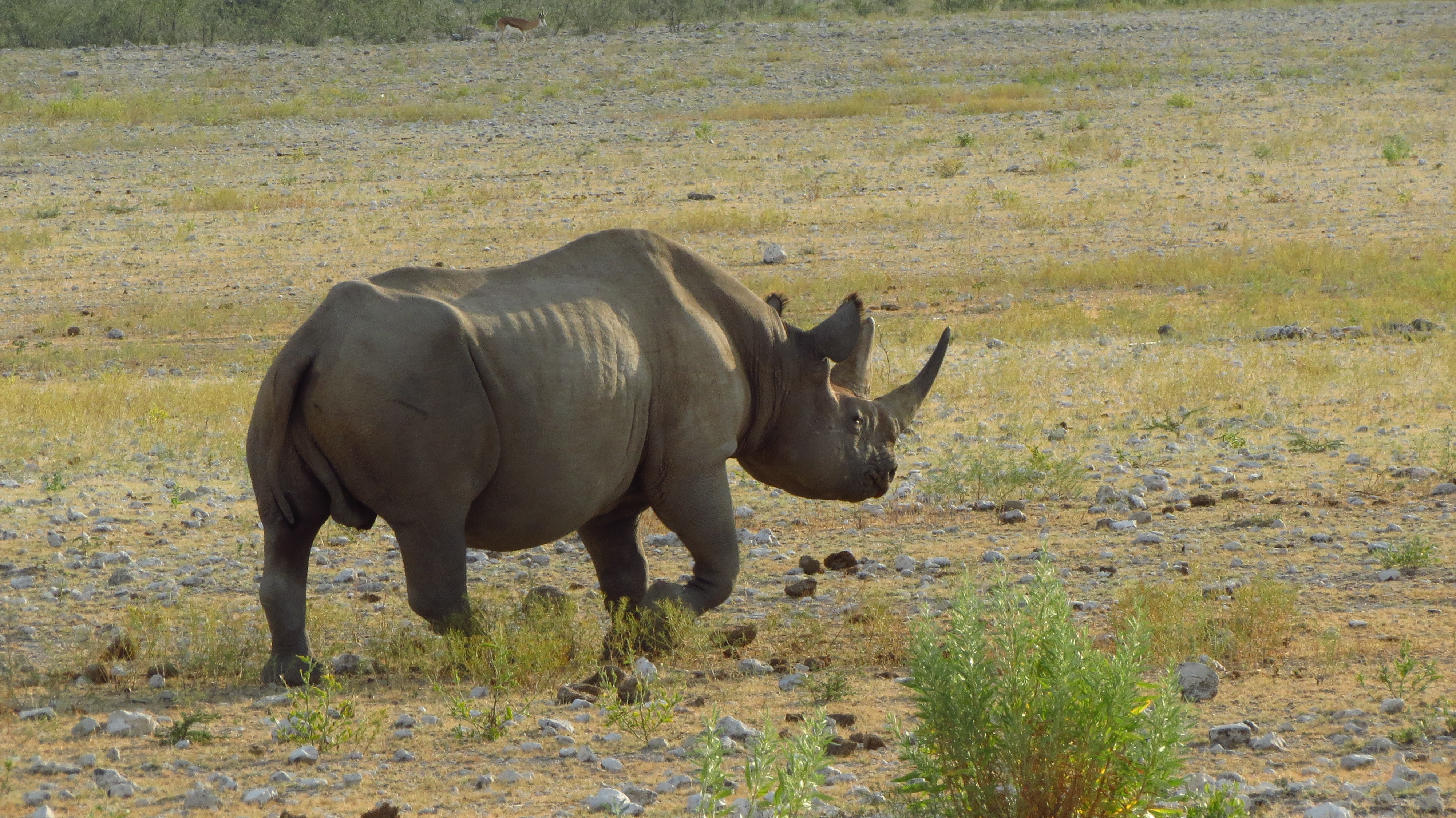


 United Kingdom
United Kingdom
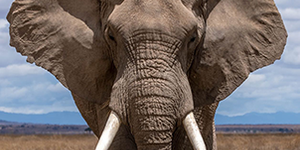
 South Africa
South Africa
 United Arab Emirates
United Arab Emirates
 Poland
Poland
 Canada
Canada
